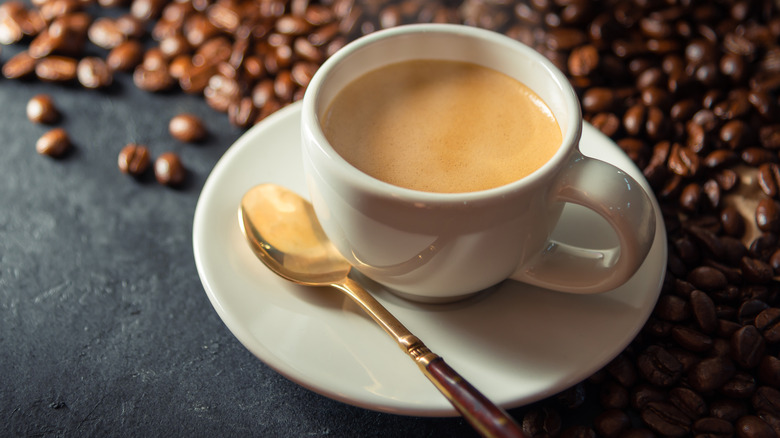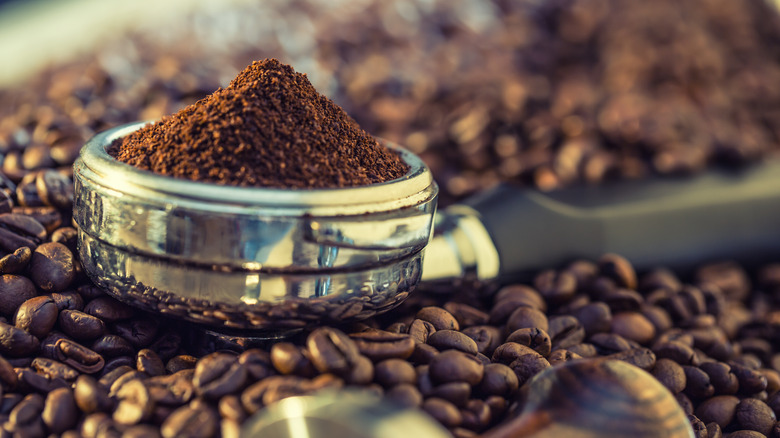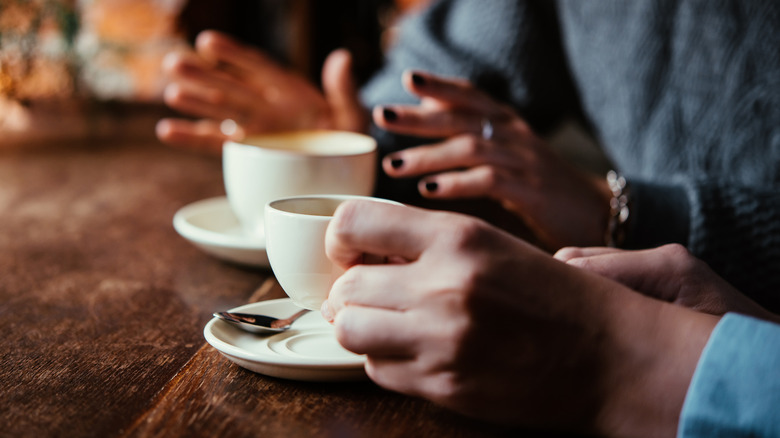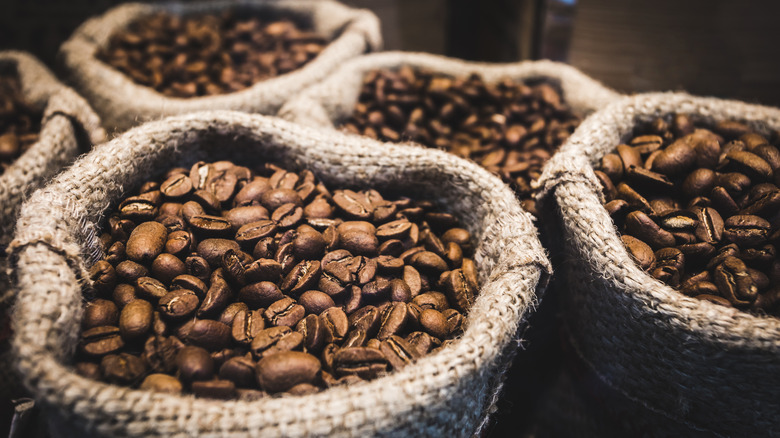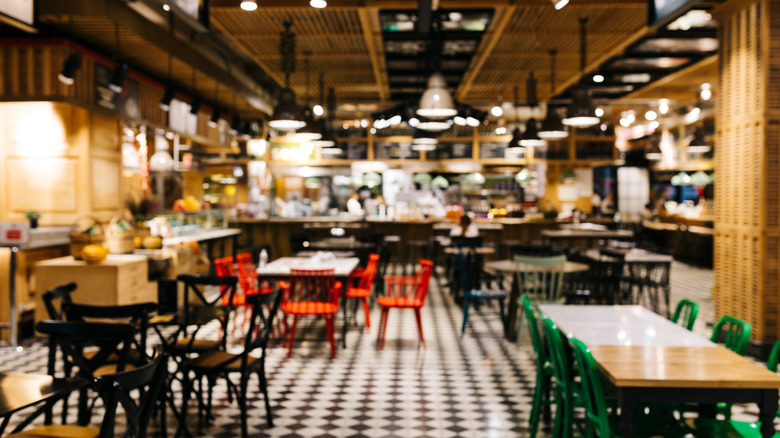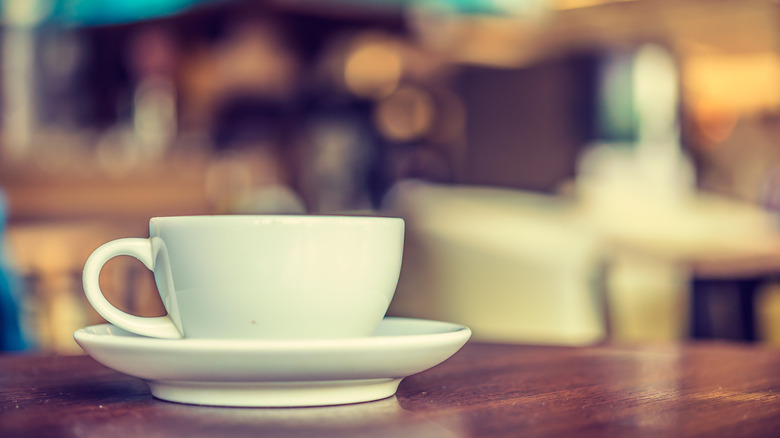Why Coffee Has Been Banned Throughout History
There are few foods more ubiquitous around the world than coffee. The caffeine-containing plant dates back hundreds (if not thousands) of years and has made its way from the world's equatorial regions to literally every corner of the planet (per National Coffee Association). You can pretty much get coffee anywhere these days. It's one of the most traded commodities in the world, and humans drink around 2 billion cups of it every single day (via BBC). No matter your relationship with the drink — whether you're a one cup in the morning kind of person, prefer a constant supply all day long, or won't even touch the stuff — there's no denying its importance on a global scale, and more specifically in American culture as well.
But this hasn't always been the case. Coffee has a very long and complicated history. As it has expanded around the world over the last several centuries, it has become so much more than a pick-me-up. Coffee has been the subject of controversial social, political, and health debates throughout history, some of which still rage on today (via Harvard University). Because of this, coffee has also been banned several times in the past as a means of settling these debates once and for all. Clearly, as your nearest Starbucks can prove, those bans didn't last, and coffee isn't going anywhere. But for the sake of curiosity (and because we're on our second cup already), it's worth exploring why coffee has been banned throughout history.
Coffee has always brought people together ... and that's been a problem for the powerful
While today many coffee lovers prefer to make and enjoy their morning cup in the comfort of their home, this isn't historically how the drink has been primarily enjoyed. After coffee made its way from Africa to the Middle East in the early 16th century, it quickly became a part of people's daily social lives. As Harvard University professor Calestous Juma explains in his book "Innovation and its Enemies," "the preexisting public institutions included the ill-reputed wine tavern; the bathhouse, reserved for the upper classes and lacking in entertainment; and the mosque, which allowed only limited exchanges before and after worship ... None of the existing social venues at the time allowed for the breadth of social discourse that occurred in the coffeehouses" (via Insider).
However, from the very beginning, the prospect of people coming together to simply talk and share ideas was a problematic one for some rulers. As early as 1511, the leader of Mecca, Khair-Beg, outlawed coffee and forced all the public coffeehouses to close (via The New York Times). He claimed coffee was sinful and its effects violated Muslim drinking laws. However, historians point out that the ban came right after Khair-Beg discovered that negative sentiments about him and his rule were being spread through the coffeehouses (via History Extra).
In the 16th century, many Italians believed coffee was satanic until the Pope tried it
Anyone who's had a little too much caffeine knows that coffee can make you feel a little crazed and jittery. A few centuries ago, that may have led some religious leaders to believe coffee was some kind of demonic drink. As coffee made its way from the Middle East and into Europe in the later 16th century, it was met with immediate suspicion (via History Hustle). The effects that it produced in people combined with the fact that it came from the Muslim world led Catholic priests in Italy to claim coffee was Satanic and enact a ban on it (via Seattle Coffee Gear).
However, the ban didn't last long. Church leaders made the mistake of asking Pope Clement VIII to try this devil's drink, and as it turns out, he loved it. In fact, he reportedly declared "this Satan's drink is so delicious ... it would be a pity to let the infidels have exclusive use of it. We shall fool Satan by baptizing it and making it a truly Christian beverage" (via The New York Times).
Coffee was also a major threat to wine and beer when it first came to Europe
It wasn't just religious leaders who were less than welcoming of coffee when it first became popular throughout Europe. The new drink, which was wildly appealing to the masses, also presented a threat to wine and beer merchants, who were not happy with the idea that people might want to drink coffee rather than alcohol, according to "The World of Caffeine: The Science and Culture of the World's Most Popular Drug" (via Brookston Beer Bulletin).
Up until that point, wine and ale were pretty much the only things to drink besides water, and they were often safer alternatives to drinking water (via The Cato Institute). But as alcohol tends to do, it made people drunk, dizzy, and unable to do their jobs well. Then coffee arrived on the scene, presenting another safe alternative to sip on that also happened to make people more alert, focused, and ready to work (via The Atlantic). So as coffee expanded, the beer and wine industry attacked back, trying to discredit coffee in the public eye and supporting coffee bans in what would ultimately turn out to be a futile resistance (via Business Insider).
In Prussia, Frederick the Great led a lifelong campaign against coffee
There was perhaps no one in history who took up arms against coffee in the name of beer more than Prussian emperor Frederick the Great, who ruled over much of the area that is now Germany and Poland (via Britannica). In the late 1700s, Frederick established a state monopoly over coffee imports and determined that while members of the aristocracy could enjoy the occasional cup of joe, it would have detrimental effects on common people (via Koffee Kompanion). Frederick explained his stance in a proclamation asserting beer's superiority over coffee (via National Coffee Association). In it, he wrote that he grew up on beer, as did his ancestors, and even claimed that "many battles have been fought and won by soldiers nourished on beer; and the King does not believe that coffee-drinking soldiers can be relied upon to endure hardships in case of another war" (via "All About Coffee").
Frederick continued his campaign against coffee for years, blasting its negative effects and raising taxes on it to keep it out of the hands of the commoners. For a time, coffee consumption in parts of Prussia decreased, according to "The World of Caffeine: The Science and Culture of the World's Most Popular Drug" (via Brookston Beer Bulletin).
Coffee has been blamed for political uprisings for centuries
Coffee's properties as a stimulant had profound effects on the lives and interactions of people as it spread around the world. It did a whole lot more than make people better workers, which is one of the biggest reasons why world leaders have tried to control its consumption over the last several centuries (via NPR). We already know coffee made people more lucid, and that coffeehouses provided centers of gathering and conversation, but the effects were not purely social. All these sober and alert people coming together and discussing their lives allowed political ideas to form and spread, and more importantly, build opposition to the status quo (via History.com).
The bottom line is that coffee is political, and leaders trying to stay in power could not have those kinds of conversations gaining traction. In essence, the majority of coffee bans throughout history can be traced back to this fundamental truth. Shortly after Mecca's ban in 1511, Cairo, Egypt, followed suit with a violent crackdown on coffee in 1532 (via Brewminate). As coffee went west into Europe, the trend continued. For example, in 1675, King Charles II banned coffeehouses throughout England. It's worth noting that the ban only lasted a week before the king was forced to back down, shedding light on yet another fundamental truth: Every single attempt to outlaw coffee throughout history eventually failed as the people fought for their right to sip, and so much more (via The New York Times).
Drinking coffee was punishable by death in the Ottoman Empire
While some historic coffee bans didn't have the chance to take hold for long, the Ottoman Empire's effort to ban coffee lasted for roughly a century and was perhaps the most brutal crackdown in history. It started in 1633 when Sultan Murad IV issued a ban on coffeehouse gatherings in Istanbul, fearing that people gathering in coffee shops would spread radical ideas and provoke social disorder ... which is exactly what they did (via Atlas Obscura). The sultan was so determined to control coffee consumption that it's reported that he would walk the streets disguised as a commoner, carrying a sword to decapitate any rule breakers he came across (via NPR).
The crackdown didn't get much better when Murad's successor came to power. Under the next ruler, coffee drinkers would be beaten on their first offense. The second time they got caught, they would apparently be sewn into a leather bag and tossed into the river to drown (via Atlas Obscura and NPR). Though the punishment was arguably not worth a mere morning pick-me-up, people still kept drinking coffee. History.com notes that bans on coffee and coffee houses in the Ottoman Empire continued well into the 18th century. Of course by then, coffee had spread well beyond the empire's control.
Coffeehouse meetings have even helped incite revolutions
Political leaders of history were right to fear the communal conversations taking place over coffee throughout the 16th, 17th, and 18th centuries. Historians point out that entire governments have been overturned because of opposition and uprisings that were fostered at coffeehouse gatherings. Specifically, it can be argued that both the American and French Revolutions were fueled by the organizing efforts that took place in coffee shops (via History.com). In fact, after the Boston Tea party in 1773, drinking coffee arguably became a symbol of patriotism in the American colonies (via The New York Times).
In France, in the years leading up to the French Revolution, there were several attempts made to ban coffee, as King Louis XV was very nervous about the radical conversations taking place in coffee shops and even employed spies to keep an ear on the anti-monarchical sentiments that were brewing amongst the public (via Koffee Kompanion). His efforts had little effect. In 1789, the call to arms for the Storming of the Bastille — the official start of the French Revolution — took place in Paris' Café de Foy (via History.com).
Women were once banned from drinking coffee in England
As with many pockets of social culture throughout history, there was a period when women specifically were restricted from coffee. That period was the late 17th century in England, as the drink became increasingly popular among men and coffeehouses began springing up all over London. Women were prohibited from gathering in the coffee shops, which were considered a society strictly for men (via The New York Times). As you can imagine, many women were not happy about this. And they were not afraid to let their feelings be known publicly (via History Extra).
In one of the most famous, and probably most hilarious, protests against coffee, a supposed group of English wives got together in 1674 to publish "The Women's Petition Against Coffee" (via Koffee Kompanion). The manifesto boldly (and rather explicitly, we might add) blasted coffee for essentially ruining men, making them lazy, drunk, either absent or annoying, and above all, impotent (via Smithsonian Magazine). That's right, women were pissed because coffee was apparently making their husbands terrible in bed. The manifesto called for a complete ban on coffee. And while King Charles would attempt such a ban a year later (for very different reasons), none of the efforts to get rid of coffee were successful (via Historic UK). At the very least for women, tea eventually became the preferred drink of the English, enabled by the rise of family-friendly tea parlors.
Sweden tried to ban coffee several times due to its supposedly harmful effects
By the 18th century, coffee had made its way to most of the world's population, and some people were drinking it like crazy. In Sweden in particular, coffee consumption was through the roof, which led the king at the time to take drastic measures to try to curb the caffeine cravings. King Gustav III banned coffee for the first time in 1746 citing "the misuses and excesses" of coffee drinking among the public (via Koffee Kompanion).
While the king was indeed concerned with some of the conversations taking place in coffee houses, his edicts against coffee were focused on the supposed negative health effects of the drink. To prove that his stance on coffee was correct, King Gustav even went as far as to conduct his own medical "experiments." He wanted to show that coffee shortened one's life span. So he acquired a set of twins, and had one consume excessive amounts of coffee, while the other drank similar amounts of tea (via National Institutes of Health). Ironically enough, both of the twins outlived the King, who was assassinated in 1792, and the coffee-drinking twin was the last to die.
Regardless, coffee was banned five times in Sweden between 1746 and 1817 (via UMGAS Magazine). But it still made an epic comeback, and since then Sweden has had one of the highest rates of coffee consumption in the world (via World Atlas). And of course, these days the consensus on coffee's actual negative and positive health effects is still up for debate.
